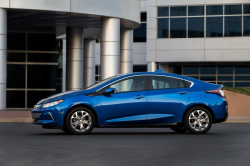
— A Chevy Volt battery energy control module class action lawsuit alleges 2016-2019 Chevrolet Volts suffer electrical system failures which cause the cars to lose propulsion.
The lawsuit further asserts the Volts can stop moving at highway speeds, and they can also allegedly fail to start.
The alleged problems are caused by the Volt battery energy control module which is part of the hybrid propulsion system and designed to keep the battery charged.
The battery energy control module is also responsible for maintaining proper battery function and regulating battery temperature to avoid overheating or freezing.
According to the class action, the Chevy Volt won't be able to function if there are problems with the battery energy control module.
Kansas plaintiff Jason Miller, who purchased a 2017 Chevy Volt, contends the battery energy control module can fail due to the internal soldering connections.
General Motors has allegedly known about the Chevy Volt battery energy control module problems but has failed to warn consumers of the issues. The automaker has also allegedly refused to offer reimbursements for repairs or replacements, and the lawsuit alleges GM has never issued a recall.
The plaintiff claims once the module has problems, the only fix is to replace and reprogram the Volt battery energy control module.
The Volt class action argues the automaker knew in June 2018 about battery energy control module failures because GM issued technical service bulletin 18-NA-261 regarding 2016-2018 Volts.
The lawsuit alleges TSB 18-NA-261 was issued to GM dealerships because the Volts were failing due to “an internal issue within the Battery Energy Control Module.”
GM no longer manufactures the Chevrolet Volt, but the lawsuit alleges GM continues to market and sell Volts containing the defective modules.
The Chevy Volt battery energy control module class action lawsuit was filed in the U.S. District Court for the Eastern District of Michigan (Southern Division): Jason Miller v. General Motors, LLC.
The plaintiff is represented by Weitz & Luxenberg, P.C., Branstetter Stranch & Jennings, PLLC, and the Indian and Environmental Law Group, PLLC.




